Archives - Publications and Beyond
 © Daguerréotype, 1855, CC0 Public Domain Designation, Chicago Art Institute.
© Daguerréotype, 1855, CC0 Public Domain Designation, Chicago Art Institute.This page presents the various supplemental material published in relation to recent academic works by CERI scholars in chronological order over the past quarter.
The supplemental material provided here—written interviews, podcasts, articles, online resources—offers a new focus on research and access to it through other formats than the work itself. All of this material is freely accessible online.
Beyond this page,
the full list of academic publications is available.
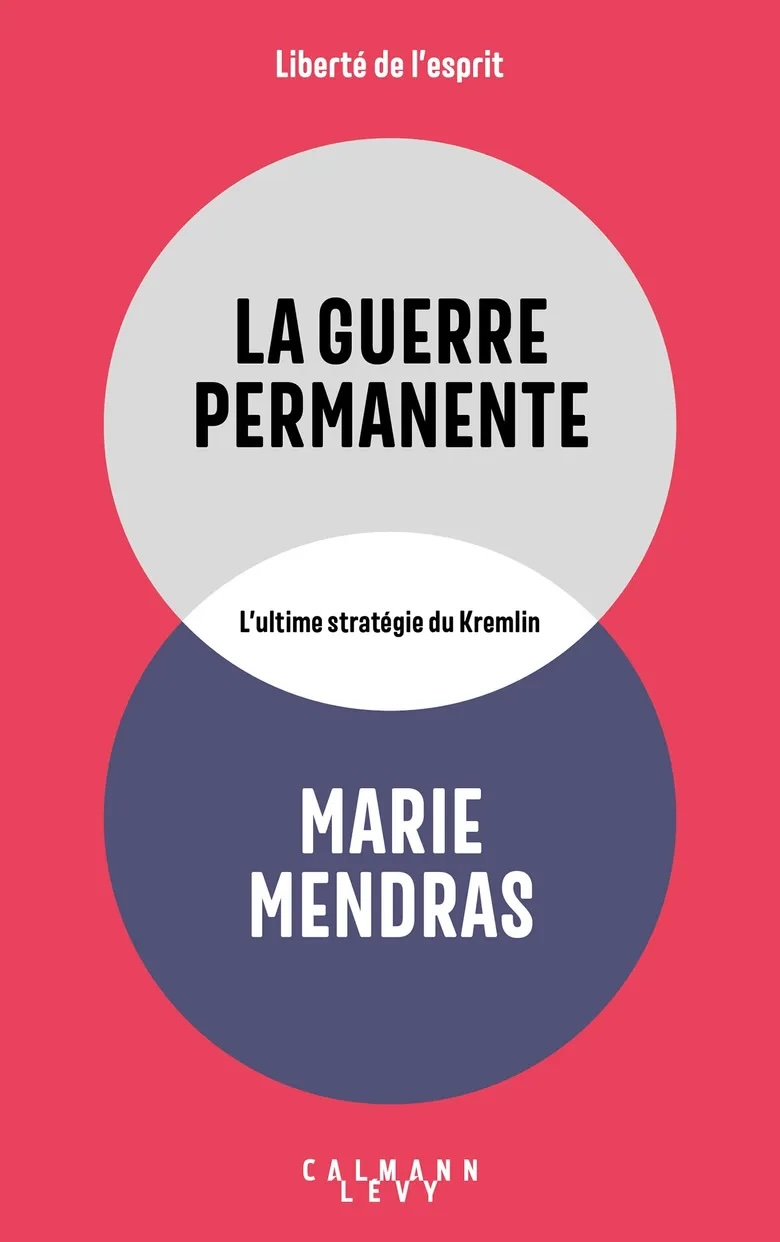
La guerre permanente - Ultime stratégie du Kremlin
Paris, Calmann-Lévy, 2024, 350 p.
Vladimir Poutine livre en Ukraine une cinquième guerre depuis 1999, après la Tchétchénie, la Géorgie, le Donbass et la Syrie. Jamais la Russie n’a réellement été menacée par ceux qu’elle attaquait, il lui a fallu trouver des prétextes : protéger des « russophones en danger », lutter contre le terrorisme, « dénazifier l’Ukraine ». Ce que craint Poutine plus que tout, c’est la démocratisation des anciennes républiques soviétiques et leur émancipation de la tutelle d’un État russe prédateur. Pour assurer la survie de son pouvoir, il mène une guerre de destruction et sacrifie les soldats russes en grand nombre. Mais il n’avait anticipé ni la résistance des Ukrainiens ni le soutien des pays occidentaux. La guerre permanente n’a fait qu’accentuer la répression à l’intérieur et fragiliser la Russie à l’extérieur. En livrant à l’Ukraine une guerre ingagnable, Poutine enferme les Russes dans une confrontation majeure avec l’Europe, l’Amérique du Nord et le Japon, et entraîne son pays vers l’abîme.
Autour de la publication
Introduction
Read the introduction
Entretiens du CERI
12 March 2024
Poutine en guerre permanente, contre tous
Entretien avec Marie Mendras, par Corinne Deloy
Podcast
29 February 2024
La guerre permanente. Pourquoi Vladimir Poutine préfère la guerre à la paix
Conférence débat organisée à l'occasion de la parution de l'ouvrage
Media
26 February 2024
"Vladimir Poutine a peur de tout le monde, comme tous les grands paranoïaques"
Entretien avec Marie Mendras, par Pauline Godart, France 24
19 February 2024
Qui peut arrêter Vladimir Poutine ?
Débat avec Marie Mendras, par Elisabeth Quin, Arte
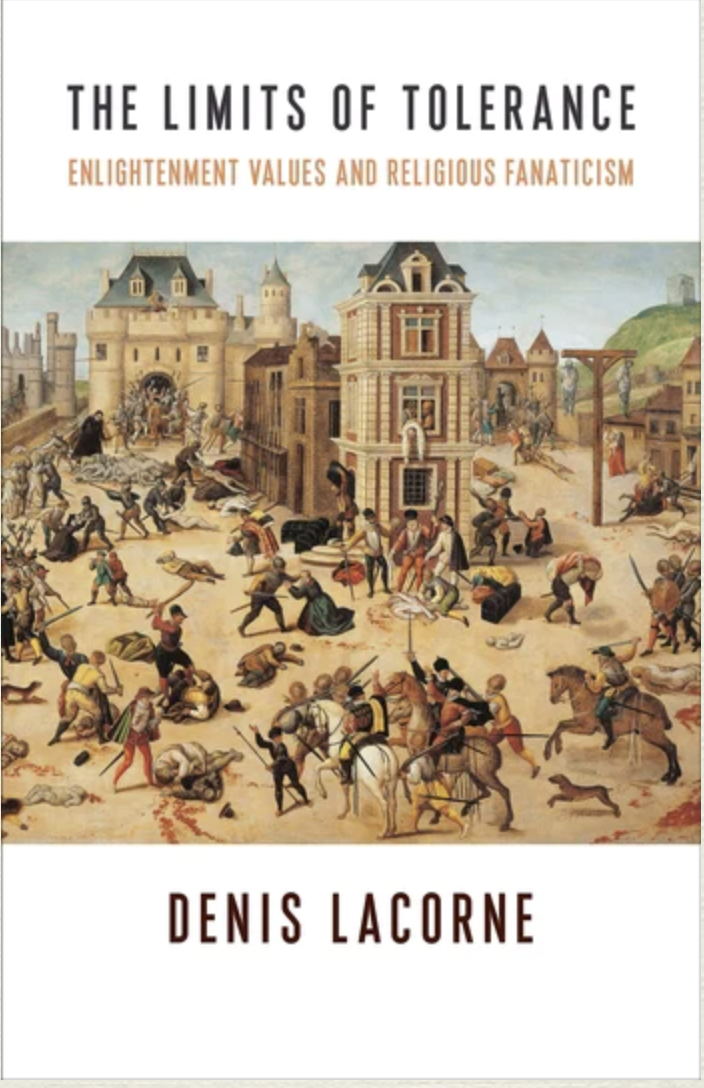
The Limits of Tolerance. Enlightenment Values and Religious Fanaticism
New York, Columbia University Press, 2019, 296 p.
The modern notion of tolerance—the welcoming of diversity as a force for the common good—emerged in the Enlightenment in the wake of centuries of religious wars. First elaborated by philosophers such as John Locke and Voltaire, religious tolerance gradually gained ground in Europe and North America. But with the resurgence of fanaticism and terrorism, religious tolerance is increasingly being challenged by frightened publics. In this book, Denis Lacorne traces the emergence of the modern notion of religious tolerance in order to rethink how we should respond to its contemporary tensions. In a wide-ranging argument that spans the Ottoman Empire, the Venetian republic, and recent controversies such as France’s burqa ban and the white-supremacist rally in Charlottesville, The Limits of Tolerance probes crucial questions: Should we impose limits on freedom of expression in the name of human dignity or decency? Should we accept religious symbols in the public square? Can we tolerate the intolerant? While acknowledging that tolerance can never be entirely without limits, Lacorne defends the Enlightenment concept against recent attempts to circumscribe it, arguing that without it a pluralistic society cannot survive. Awarded the Prix Montyon by the Académie Française, The Limits of Tolerance is a powerful reflection on twenty-first-century democracy’s most fundamental challenges.
Autour de la publication
Podcast
10 February 2024
Beyond the Text. The interviews - Denis Lacorne on The Limits of Tolerance
Interview of Denis Lacorne, by Samuel Woodwall
Videos
6 October 2021
The Secular State and Religious Tolerance
A conference by Prof. Denis Lacorne, Berkeley Center for the Study of Religion
13 April 2021
Religious Liberty in France and America: A Constitutional Dialogue
Discussion with Denis Lacorne, National Constitution Center (Philadelphia)
19 January 2021
Keynote Address: Religious Tolerance Revisited
Denis Lacorne, Toleration in Comparative Perspective Conference (January 19-23, 2021), UC Berkeley
Entretiens du CERI
23 January 2020
¿La tolerancia es política?
Entrevista con Denis Lacorne, por Miriam Périer, Metapolítica
25 April 2019
Is Tolerance Political?
Interview with Denis Lacorne, by Miriam Périer
Book reviews
18 March 2021
John R. Williams, Studies in Religion
20 January 2020
Journey towards a tolerant society
Uday Balakrishnan, The Hindu Business Line
18 May 2019
The encouraging history—and ongoing puzzle—of tolerance
The Economist
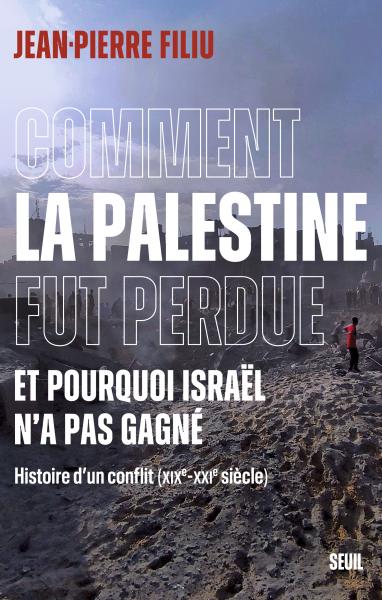
Paris, Seuil, 2024, 432 p.
Si vous estimez connaître assez du conflit israélo-palestinien pour en nourrir des opinions définitives, mieux vaut ne pas ouvrir ce livre. Vous risqueriez d’y apprendre que le sionisme fut très longtemps chrétien avant que d’être juif. Et que l’évangélisme anglo-saxon explique beaucoup plus qu’un fantasmatique « lobby juif » le soutien déterminant de la Grande-Bretagne, puis des États-Unis à la colonisation de la Palestine. Vous pourriez aussi découvrir que la soi-disant « solidarité arabe » avec la Palestine a justifié les rivalités entre régimes pour accaparer cette cause symbolique, quitte à massacrer les Palestiniens qui résistaient à de telles manoeuvres. Ou que la dynamique factionnelle a, dès l’origine, miné et affaibli le nationalisme palestinien, culminant avec la polarisation actuelle entre le Fatah de Ramallah et le Hamas de Gaza. La persistance de l’injustice faite au peuple palestinien n’a pas peu contribué à l’ensauvagement du monde actuel, à la militarisation des relations internationales et au naufrage de l’ONU, paralysée par Washington au profit d’Israël durant des décennies, bien avant de l’être par Moscou sur la Syrie, puis sur l’Ukraine. L’illusion qu’un tel déni pouvait perdurer indéfiniment a volé en éclat dans l’horreur de la confrontation actuelle, d’autant plus tragique qu’aucune solution militaire ne peut être apportée au défi de deux peuples vivant ensemble sur la même terre. Comprendre comment la Palestine fut perdue, et pourquoi Israël n’a pourtant pas gagné, participe dès lors d’une réflexion ouverte sur l’impératif d’une paix enfin durable au Moyen-Orient et, donc, sur le devenir de ce nouveau millénaire.
Autour de la publication
Media
19 février 2024
Guerre Israël-Hamas : l’abandon de Gaza ?
Entretien avec Jean-Pierre Filiu, par Quentin Lafay, France Culture
13 February 2024
Guerre Israël-Hamas : l’offensive israélienne sur Rafah alarme la communauté internationale
Interview with Jean-Pierre Filiu, by Anne-Elisabeth Lemoine, France 5
Comment mettre un terme à la guerre au Proche-Orient ?
Débat avec Jean-Pierre Filiu, par Patrick Saint-Paul, Le Figaro
12 February 2024
Israël/Hamas : une guerre sans fin ?
Débat avec Jean-Pierre Filiu, par Thomas Hugues, Public Sénat
08 February 2024
« Israël est en train de détruire Gaza sans détruire le Hamas »
Entretien avec Jean-Pierre Filiu, par Mathieu Magnaudeix, Mediapart
06 February 2024
L'invité de 8h20 : le grand entretien
Entretien avec Jean-Pierre Filiu, par Nicolas Demorand et Léa Salamé, France Inter
29 November 2023
Israël-Palestine : Les Palestiniens
Série d'entretiens avec Jean-Pierre Filiu, par Thomas Snégaroff, France Inter
Book extract
February 2024
Read the extract
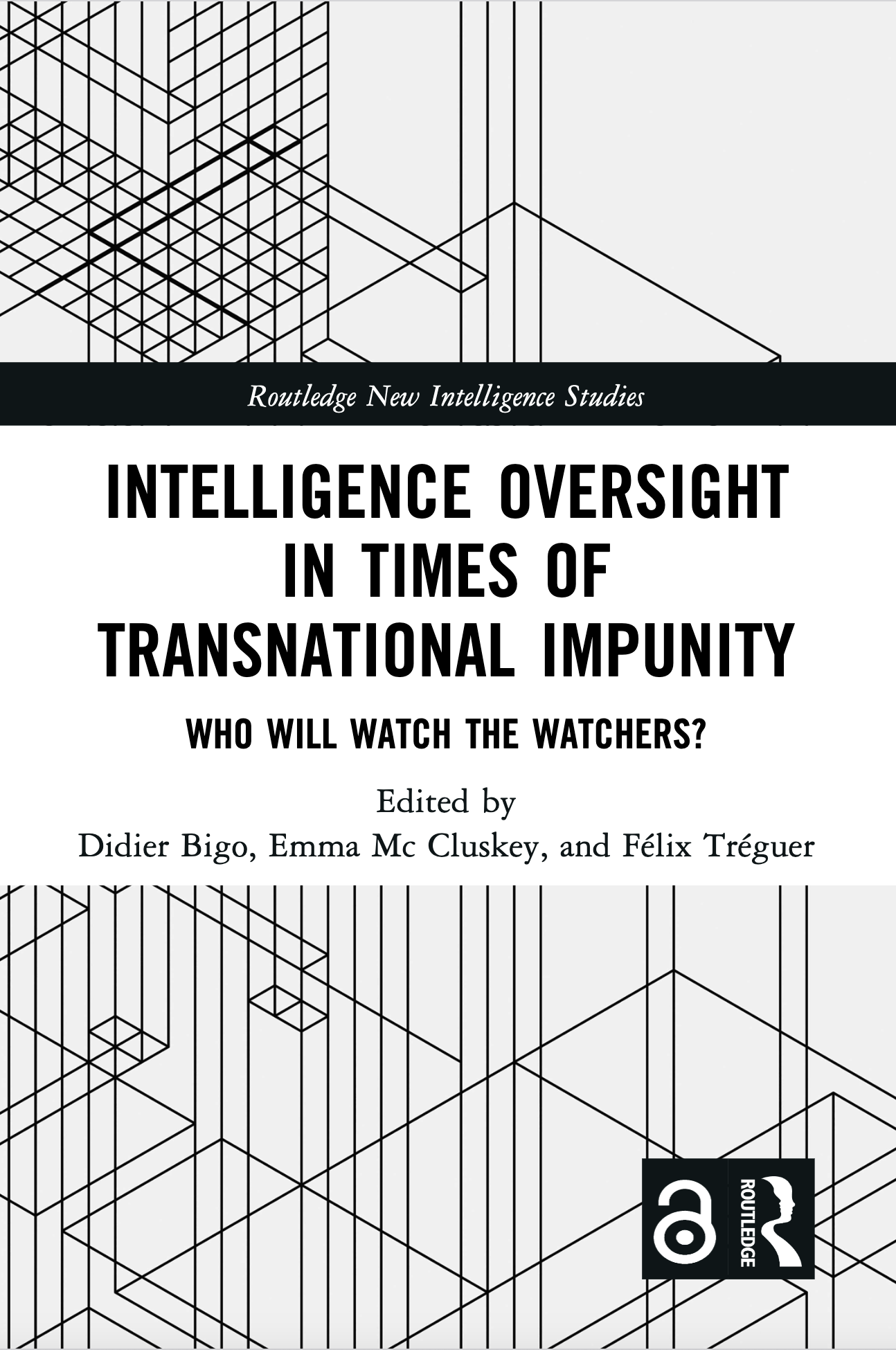
Didier Bigo, Emma Mc Cluskey, Félix Tréguer
New Intelligence Studies, New York, Routledge, 2023, 311 p.
This book adopts a critical lens to look at the workings of Western intelligence and intelligence oversight over time and space. Largely confined to the sub-field of intelligence studies, scholarly engagements with intelligence oversight have typically downplayed the violence carried out by secretive agencies. These studies have often served to justify weak oversight structures and promoted only marginal adaptations of policy frameworks in the wake of intelligence scandals. The essays gathered in this volume challenge the prevailing doxa in the academic field, adopting a critical lens to look at the workings of intelligence oversight in Europe and North America. Through chapters spanning across multiple disciplines – political sociology, history, and law – the book aims to recast intelligence oversight as acting in symbiosis with the legitimisation of the state’s secret violence and the enactment of impunity, showing how intelligence actors practically navigate the legal and political constraints created by oversight frameworks and practices, for instance by developing transnational networks of interdependence. The book also explores inventive legal steps and human rights mechanisms aimed at bridging some of the most serious gaps in existing frameworks, drawing inspiration from recent policy developments in the international struggle against torture. This book will be of much interest to students of intelligence studies, sociology, security studies, and international relations.
Autour de la publication
Entretiens du CERI
22 January 2024
Intelligence Agencies: Never Accountable?
Interview with Didier Bigo, Emma Mc Cluskey & Félix Tréguer, by Miriam Périer
Open Access
January 2024
Full book available in Open Access
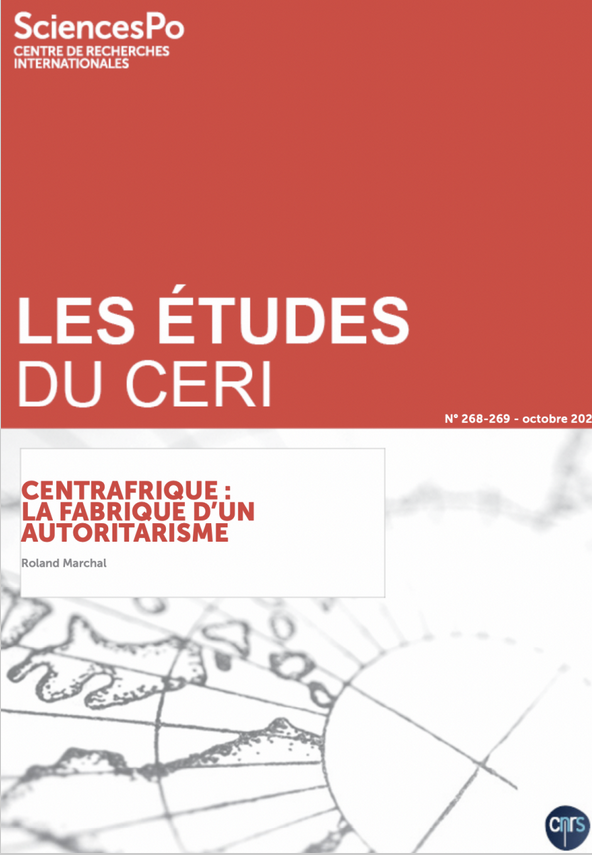
Les Études du CERI, n°268-269, October 2023, 68 p.
This text analyses the conditions in which the Central African Republic, a failed state emerging from an existential crisis, is able to play on its own weaknesses and a particular regional and international configuration to coerce the political arena, terrorizing its own population by creating an enemy that is inevitably foreign, and using Russia as an instrument to perpetuate itself. The means and techniques of coercion are extremely modern, even if they are based on a repertoire of coercive practices already well established in Central Africa. Such authoritarianism is based on the construction of a specific threat (transnational armed groups), a lacklustre international community that is exhausting itself in implementing outdated solutions, and a security offer that relegates UN peacekeeping or European training missions to the sidelines: Russian and Rwandan military involvement reflects a desire to substitute the regional and international management of the crisis, while at the same time maintaining a concessionary economy in the mining and agricultural sectors, the primary beneficiaries of which continue to be the rulers in Bangui.
Autour de la publication
ENTRETIENS du CERI
17 January 2024
Centrafrique: la fabrique d'un autoritarisme
Entretien avec Roland Marchal, par Corinne Deloy
23 January 2024
A New Authoritarianism in the Central African Republic?
Interview with Roland Marchal, by Corinne Deloy
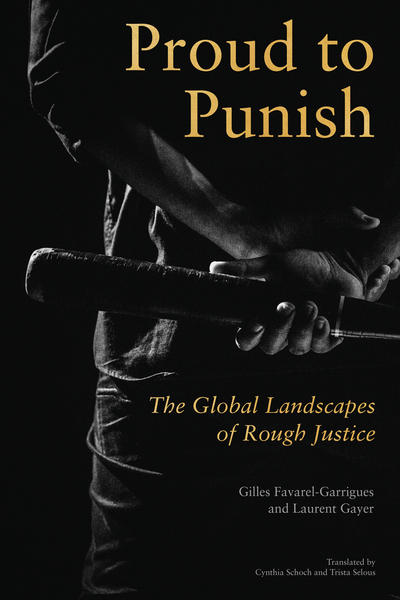
Palo Alto, Stanford University Press, 2024, 234 p. Translated by Cynthia Schoch and Trista Selous
A magisterial comparative study, Proud to Punish recenters our understanding of modern punishment through a sweeping analysis of the global phenomenon of "rough justice": the use of force to settle accounts and enforce legal and moral norms outside the formal framework of the law. While taking many forms, including vigilantism, lynch mobs, people's courts, and death squads, all seekers of rough justice thrive on the deliberate blurring of lines between law enforcers and troublemakers. Digital networks have provided a profitable arena for vigilantes, who use social media to build a following and publicize their work, as they debase the bodies of the accused for purposes of edification and entertainment. It is this unabashed pride to punish, and the new punitive celebrations that actualize, publicize, and commercialize it, that this book brings into focus. Recounted in lively prose, Proud to Punish is both a global map of rough justice today and an insight into the deeper nature of punishment as a social and political phenomenon.
Autour de la publication
Introduction of the book
Introduction. Breaking the Law to Maintain Order
Gilles Favarel Garrigues and Laurent Gayer
Video
26 March 2024
Le monde des justiciers hors-la-loi
Conférence de Gilles Favarel-Garrigues autour du livre, Avenue centrale. Rendez-vous en sciences humaines (MSH-Alpes)
Entretiens du CERI
10 May 2021
La loi des justiciers. Vigilantisme et maintien de l'ordre
Entretien avec Gilles Favarel Garrigues et Laurent Gayer par Miriam Périer
06 May 2021
Punishing with Pride. Vigilantism and Policing
Interview with Gilles Favarel Garrigues and Laurent Gayer by Miriam Périer
Promotion of the French version
2021
Reviews, podcasts, articles and more
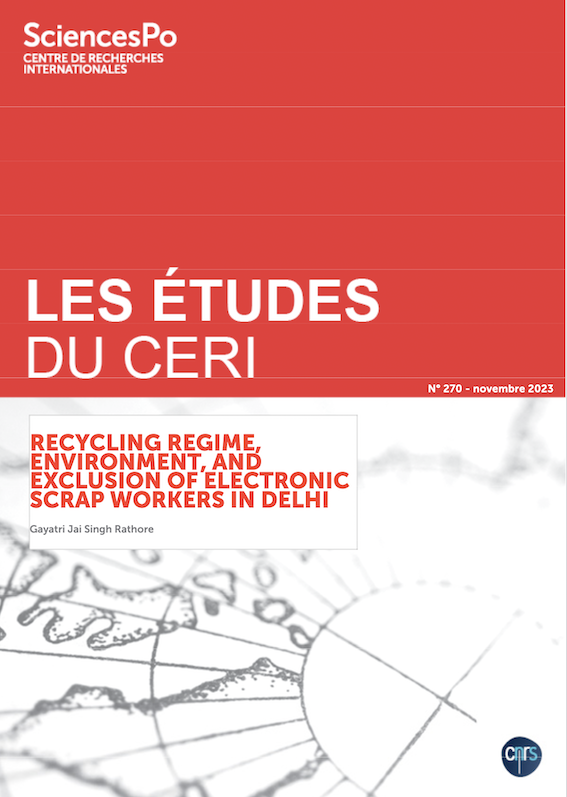
Gayatri Jai Singh Rathore
Recycling Regime, Environment, and Exclusion of Electronic Scrap Workers in Delhi
Les Études du CERI, n°270, December 2023.
In recent years, the Indian e-waste sector has undergone a process of formalisation through the implementation of E-waste Management Rules (2016), leading to the creation of what I call recycling regime. The upper and middle classes, along with NGOs and industry actors, are frontrunners in thinking about e-waste policies. They were prompted by a twofold motive: the desire for a “world-class”, clean, and pollution-free city; and seizing business opportunities by extracting value from e-waste. Rather than replacing the State, they co-opted the State so that it would legislate to safeguard the environment, and address toxicity and health problems associated with e-waste. Recycling regime relies on formalisation processes embedded in multiple technologies – technicity, capital-intensive facilities, certifications, authorisations, and licences – that work together to exclude the “informal” sector from the e-waste governance system. Recycling technologies act as “technologies of domination” that further contribute to sidelining the “informal” labour of scrap workers or e-kabadis, who as Muslims already find themselves on the margins of society. However, the recycling regime fails to safeguard the environment in the end as e-waste trickles down back to the informal sector via authorised actors.(transnational armed groups), a lacklustre international community that is exhausting itself in implementing outdated solutions, and a security offer that relegates UN peacekeeping or European training missions to the sidelines: Russian and Rwandan military involvement reflects a desire to substitute the regional and international management of the crisis, while at the same time maintaining a concessionary economy in the mining and agricultural sectors, the primary beneficiaries of which continue to be the rulers in Bangui.
Autour de la publication
Entretiens du CERI
8 January 2024
Indian E-Waste Management. A Recycling Regime
Interview with Gayatri Jai Singh Rathore, by Miriam Périer

The Transnational Society. A Social Theory of Cross Border Linkages
Cham, Palgrave Macmillan, 2023, 151 p.
This book is the first of a work in two parts addressing the relations between the transnational society and the state. It is dedicated to the analysis and conceptualisation of transnational societies. This work moves beyond the mere depiction of transborder socialities by shedding light on the fundamental structures underpinning them. It investigates the mechanics of their formation and evolution, their demise or transformation into diasporas. It theorises transmigrants as plural humans embedded and socialised in multiple settings, and whose activities are sustained and framed by three key social institutions: transnational families, businesses and associations. It sheds light on the construction of an intersubjective moral framework regulating the relations between migrants and non-migrants. Finally, it examines the space-time continuum of transnational societies.
Autour de la publication
Entretiens du CERI
13 December 2023
What is the Transnational Society?
Interview with Thomas Lacroix, by Miriam Périer

When Men Fell from the Sky. Civilians and Downed Airmen in Second World War Europe
Cambridge, Cambridge University Press, 2023, 320 p.
Between 1940 and 1945, more than 100,000 airmen were shot down over Europe, a few thousand of whom survived and avoided being arrested. When Men Fell from the Sky is a comparative history of the treatment of these airmen by civilians in France, Germany and Britain. By studying the situation on the ground, Claire Andrieu shows how these encounters reshaped societies at a local level. She reveals how the fall of France in 1940 may have concealed an insurrection nipped in the bud, that the 'People's War' in Britain was not merely a myth, and that in Germany, the 'racial community of the people' had in fact become a social reality with Allied airmen increasingly subjected to lynching from 1943 onwards. By considering why the treatment of these airmen contrasted so strongly in these countries, Andrieu sheds new light on how civilians reacted when confronted with the war 'at home'.
Autour de la publication
Entretiens du CERI
05 July 2021
Sociétés comparées en temps de guerre: Le choc des cultures politiques
Entretien avec Claire Andrieu à l'occasion de la parution de son ouvrage, par Miriam Périer
Comparing Societies in Wartime: The Clash of Political Cultures
Interview with Claire Andrieu by Miriam Périer
Media
28 May 2021
HShow 414 - Pandémies, pilotes et Pie XII
Entretien avec Claire Andieu, par Jean-Christophe Buisson, Histoire TV (à partir de 14'14)
Podcast
21 November 2023
War and Memory Compared Civilians and Downed Airmen in WW2 Europe
Audio recording of the seminar held at CERI on 21 November 2023
19 April 2021
Le sort des aviateurs abattus dans la Seconde Guerre mondiale
Entretien avec Claire Andrieu, par André Loez, Paroles d'histoire

Bulgaria, the Jews, and the Holocaust. On the Origins of a Heroic Narrative
University of Rochester Press (Rochester Studies in East and Central Europe), 2023, 406 p.
During World War II, even though Bulgaria was an ally of the Third Reich, it never deported its Jewish community. Until recently, this image of Bulgaria as a European exception has prevailed—but at a cost. For it ignored the roundup of almost all the Jews living in the Yugoslav and Greek territories under Bulgarian occupation between 1941 and 1944, who were in fact deported to Poland, where they were murdered. In this new English translation of her work originally published in French, Nadège Ragaru presents a riveting, wide-ranging archival investigation encompassing 80 years and six countries (Bulgaria, Germany, the United States, Israel, North Macedonia and Serbia), in doing so exploring the origins and perpetuation of this heroic narrative of Bulgaria's past. Moving between legal and political spheres, from artistic creations to museum exhibits, from the writing of history to transnational public controversies, she shows how the Holocaust north of the Danube became a "rescue" to the river's south. She traces how individual merits were turned into "national" achievements, while blame for the deportations was planted squarely on Nazi Germany. And she illuminates how discussions on the Holocaust in Bulgaria were held hostage to Cold War dynamics before 1989, only to yield to political and memorial struggles afterwards. Ultimately, she restores Jewish voices to the story of their own wartime suffering.
Autour de la publication
Entretiens du CERI
28 novembre 2023
A Heroic Narrative about Bulgaria, the Jews and the Holocaust?
Interview with Nadège Ragaru, by Corinne Deloy
01 septembre 2021
Et les juifs bulgares furent sauvés
Entretien avec Nadège Ragaru, par Corinne Deloy
Article
31 March 2021
La Bulgarie a-t-elle « sauvé » ses Juifs ?
Nadège Ragaru, L'Histoire n°482
Podcast
03 December 2021
A History of Knowledge about the Holocaust in Bulgaria
Entretien avec Nadège Ragaru, The Southeast Passage
08 February 2021
Les contours de la Shoah en Bulgarie
Entretien avec Nadège Ragaru, par André Loez, Paroles d'histoire










